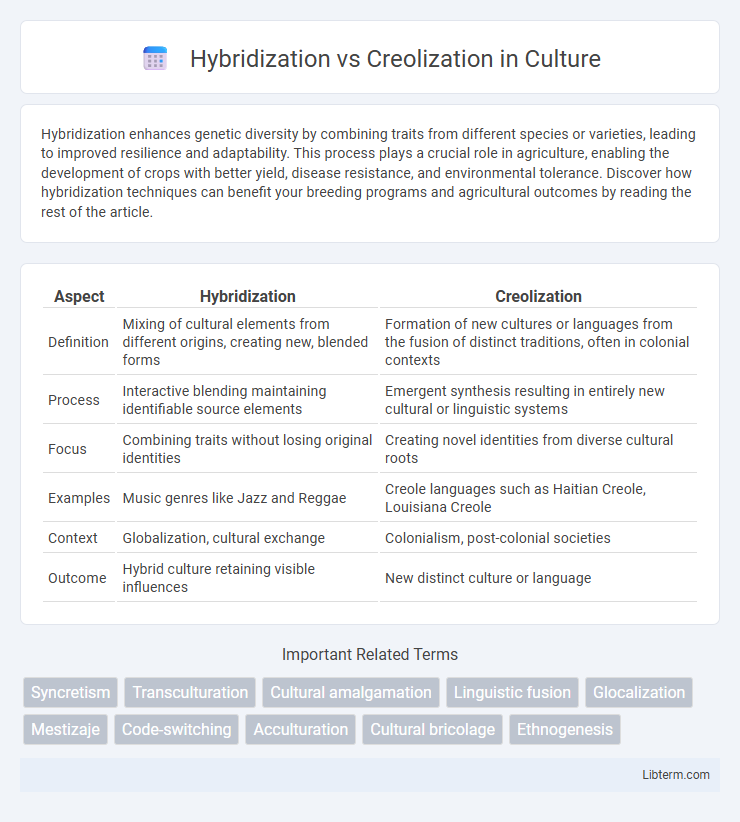Hybridization enhances genetic diversity by combining traits from different species or varieties, leading to improved resilience and adaptability. This process plays a crucial role in agriculture, enabling the development of crops with better yield, disease resistance, and environmental tolerance. Discover how hybridization techniques can benefit your breeding programs and agricultural outcomes by reading the rest of the article.
Table of Comparison
| Aspect | Hybridization | Creolization |
|---|---|---|
| Definition | Mixing of cultural elements from different origins, creating new, blended forms | Formation of new cultures or languages from the fusion of distinct traditions, often in colonial contexts |
| Process | Interactive blending maintaining identifiable source elements | Emergent synthesis resulting in entirely new cultural or linguistic systems |
| Focus | Combining traits without losing original identities | Creating novel identities from diverse cultural roots |
| Examples | Music genres like Jazz and Reggae | Creole languages such as Haitian Creole, Louisiana Creole |
| Context | Globalization, cultural exchange | Colonialism, post-colonial societies |
| Outcome | Hybrid culture retaining visible influences | New distinct culture or language |
Defining Hybridization and Creolization
Hybridization refers to the process of combining elements from different cultural, linguistic, or social systems to create new forms that retain features of the original sources. Creolization specifically involves the emergence of entirely new, stable languages or cultures resulting from the mixing of colonial and indigenous languages or traditions, often in contact zones. While hybridization emphasizes ongoing blending and fluid identities, creolization highlights the formation of distinct, fully developed systems from diverse origins.
Historical Origins of Hybridization
Hybridization in cultural contexts traces back to ancient interactions between distinct societies through trade, conquest, and migration, leading to the blending of languages, customs, and beliefs. Historical examples include the Hellenistic period, where Greek culture merged with Egyptian and Persian elements, forming new hybrid identities. This process contrasts with creolization, which primarily emerges from colonial-era contact zones producing new, stable cultural systems from the fusion of European and African heritages.
The Emergence of Creolization
The emergence of creolization refers to the process by which distinct languages and cultures blend to form entirely new, stable systems characterized by unique grammatical structures and vocabularies, often arising in colonial and postcolonial contexts. Unlike hybridization, which involves the mixing of existing cultural or linguistic elements without complete system transformation, creolization results in a novel, fully functioning language or cultural identity distinct from its source components. This phenomenon is commonly observed in Caribbean and Atlantic communities where African, European, and Indigenous influences synergize to create dynamic creole languages and cultural forms.
Key Differences Between Hybridization and Creolization
Hybridization involves the blending of elements from different cultures or languages to create a new, mixed form, often maintaining the distinct characteristics of the original sources. Creolization refers to the process where a new, stable cultural or linguistic system emerges from the long-term contact and fusion of multiple influences, resulting in a unique identity that transcends its components. Key differences include hybridization's emphasis on coexistence and mixing without full integration, while creolization implies the formation of an entirely new, coherent system with its own rules and norms.
Hybridization in Language and Culture
Hybridization in language and culture refers to the process through which elements from distinct linguistic and cultural systems blend, creating new, dynamic forms of expression that transcend traditional boundaries. This phenomenon generates innovative vocabulary, grammar structures, and cultural practices influenced by globalization, migration, and digital communication. It differs from creolization by emphasizing ongoing, fluid interactions rather than the complete fusion of languages resulting in a stable, new creole language.
Creolization in Linguistic Evolution
Creolization in linguistic evolution involves the formation of a new, stable language from the mixing of multiple languages, typically emerging in contexts where speakers of different tongues need to communicate regularly, such as in colonial settings. Unlike hybridization, which blends elements of languages without creating a fully new system, creolization produces a distinct grammar and vocabulary, leading to the establishment of a creole language with native speakers. This process significantly contributes to language diversity by generating novel linguistic structures that reflect unique sociocultural histories.
Social Implications of Hybridization
Hybridization in social contexts often leads to the blending of cultural identities, fostering increased intercultural understanding and innovation but also raising concerns about cultural homogenization and identity loss. This process can empower marginalized groups by enabling the creation of new, hybrid identities that challenge dominant cultural norms and promote social inclusion. However, hybridization may simultaneously provoke resistance from communities seeking to preserve traditional cultural boundaries and authenticity.
Creolization and Identity Formation
Creolization fosters identity formation by blending diverse cultural elements into a new, distinct cultural expression, transcending mere hybridization, which often denotes a simple mix of traits. This dynamic process shapes unique social identities and collective narratives, particularly in postcolonial societies where creolization reflects historical interactions and resistance. By enabling continuous cultural negotiation and innovation, creolization profoundly influences how communities construct and perceive their identities.
Case Studies: Examples of Hybridization and Creolization
Case studies of hybridization reveal cultural practices blending distinct traditions, such as the fusion of Afro-Caribbean and European elements in Brazilian samba, highlighting dynamic cultural exchange. Creolization case studies emphasize the emergence of new, stable cultures from the contact of multiple languages and customs, exemplified by Haitian Creole's formation from French and African languages. These examples underscore hybridization's process of mixing existing traits versus creolization's creation of novel cultural identities.
Globalization’s Influence on Hybridization and Creolization
Globalization accelerates hybridization by facilitating cross-cultural exchanges where elements of diverse cultures merge to create new, dynamic identities and practices, such as in language, cuisine, and fashion. Creolization, driven by globalization, occurs when distinct cultural groups interact intensively, leading to the emergence of entirely new, stable cultural forms exemplified by creole languages in the Caribbean and Indian Ocean regions. Both processes reflect the complex influence of globalization on cultural evolution, highlighting the blending and reconfiguration of global cultural elements into localized, hybrid or creolized outcomes.
Hybridization Infographic

 libterm.com
libterm.com